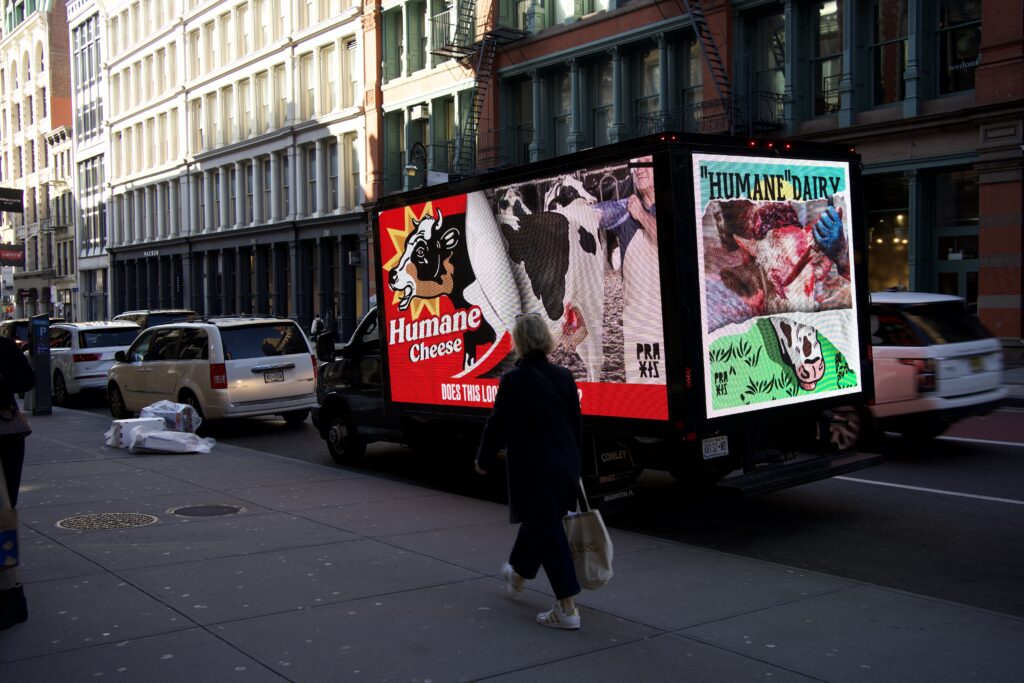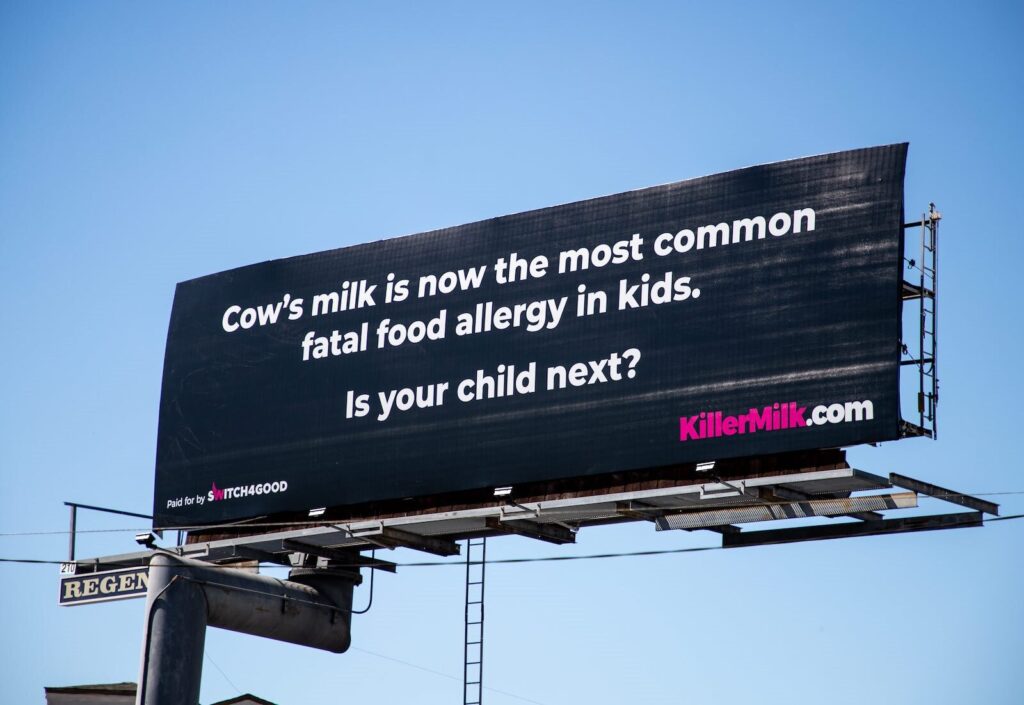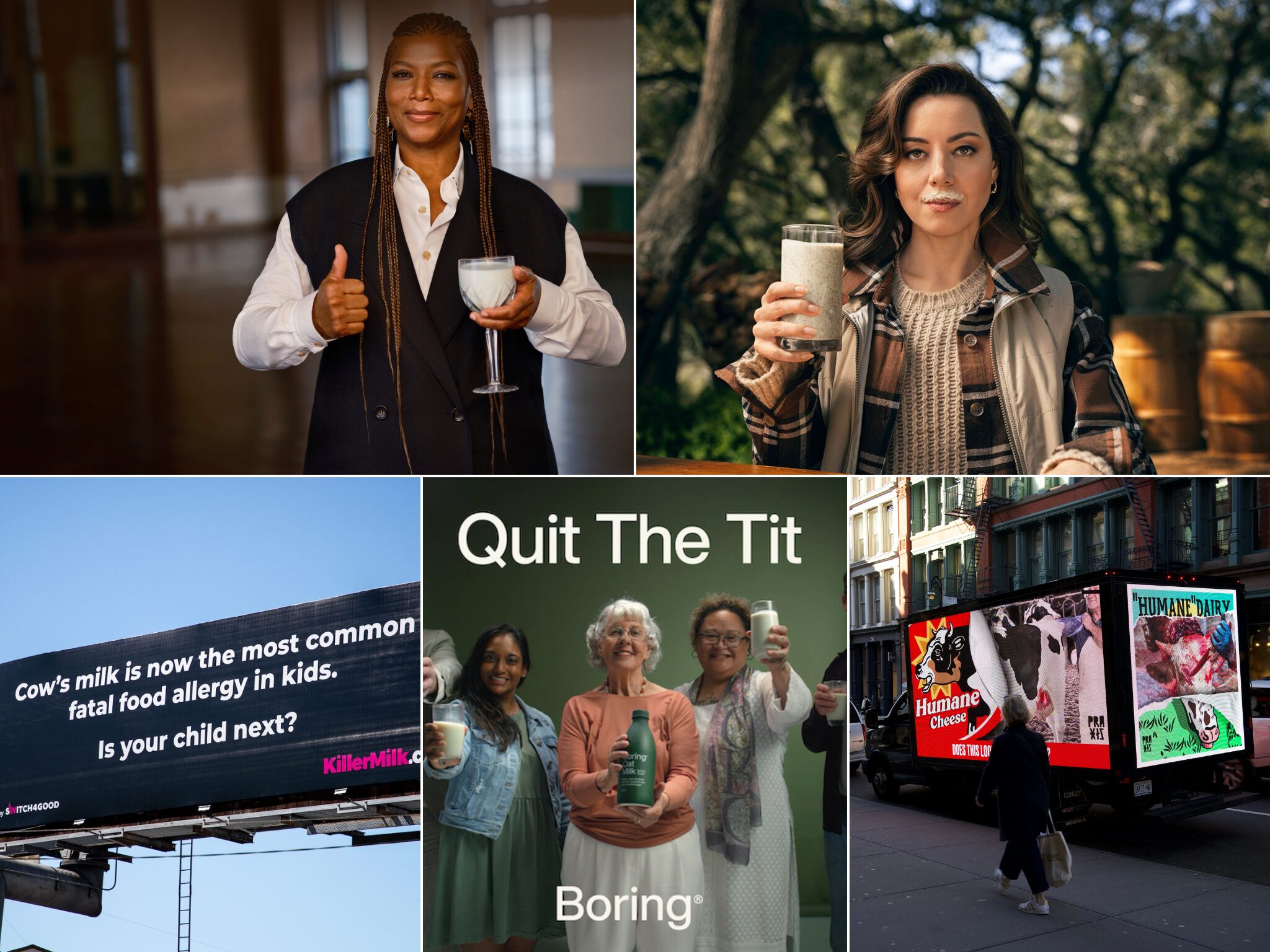The Milk Wars: Dairy vs Plant-Based Marketing Campaigns Boil Over
8 Mins Read
Is it okay to drink milk, or do you need to “quit the tit”? A host of campaigns over the last few months have been intensifying the dairy industry’s battle with the plant-based sector, which has responded with its own initiatives to leave the milk category boiling over.
Stop milk-shaming! Queen Latifah says it’s okay to drink milk.
Quit the tit! You can wean off bovine milk with Boring Oat Milk.
“Happy cows”? You’ve got to be kidding, according to street artist Praxis.
In the last few months, the dairy marketing wars have been simmering, and are now reaching a tipping point. Big Dairy has forked out millions to get celebrities to tell you “real milk” is great and everything else isn’t, while funding studies that tell you something you already know (alt-milk is more expensive) without mentioning what you might not (plant-based milks, accounting for 16% of the market, receive 0.1% of the subsidies laid out to the dairy industry)
The latter has hit back – whether it’s an oat milk company using wacky marketing to get you to wean off dairy, or street artists employing activism to enlighten the supposed bullshit being thrown at you. It’s all happening.
How the Got Milk? campaign has spent its millions
In November, rapper and actress Queen Latifah appeared in a fake PSA targeting the ‘bullying’ faced by milk-drinkers in various social situations. The nearly three-minute spot features actors giving interviews where they recall situations in which they were ‘milk-shamed’ – one man had a date splash milk all over him, one mother kept facing work and sleep interruptions from her dairy-free daughter, another mom saw her kid ousted from baseball league after bringing chocolate milk, while a city council candidate’s campaign got derailed after the resurfacing of an old video of him chugging milk.
If it sounds ridiculous, it’s because it’s meant to be (the ad was written by two SNL alums). Funded by Dairy Management Inc and the Milk Processor Education Program (MilkPEP) – the organisation behind the Got Milk? campaign – the OK2Milk ad followed a marketing drive that took a more overt approach. In April, MilkPEP tapped actress Aubrey Plaza to feature in a fake commercial for Wood Milk, where she describes the virtues and qualities of milk made from woods in her characteristic deadpan, sarcastic tone, before ending with the line: “Is Wood Milk real? Absolutely not. Only real milk is real.”
This ad came as a direct response to the FDA’s draft guidance for the labelling of milk alternatives in the US, which suggested that while vegan companies were okay to use the word ‘milk’ on their packaging, they should bear a voluntary nutritional statement to describe the differences with conventional milk.
Both campaigns exhibited an underlying unease in the dairy industry, which has collectively spent over $100M since 2008 to inhibit the use of dairy-related terms on dairy-free products. In fact, nearly all of MilkPEP’s $7M ad budget has been spent since the FDA issued its guidance.
The Aubrey Plaza ad particularly faced significant backlash, not least because it was reported to the USDA by the Physicians Committee for Responsible Medicine (PCRM), which called the commercial illegal. MilkPEP, it argued, is prohibited by law from engaging in “any advertising… that may be false or misleading or disparaging to another agricultural commodity” and federal regulation from employing “unfair or deceptive acts or practices with respect to the quality, value or use of any competing product”.
The complaint was filed in May 2023, and as of December, PCRM still hadn’t heard back from the USDA. But MilkPEP will hope that the damage has already been done, given that, unlike its meat counterpart, plant-based dairy saw a higher revenue last year. As of mid-July, milk alternatives (7%) outpaced conventional milk (4.6%) on annual dollar sales (though unit sales for non-dairy milks declined at a higher rate than cow’s milk).
Despite this growth, vegan options currently still command just 16% of the US milk market – but that’s still quite a jump from the soy-or-nothing oblivion at the beginning of the 2010s. One food and drink analyst told the New York Times in 2022 that plant-based milk alternatives could take up 30% of the total dairy dollar share by the end of 2026.
Plant-based activists respond to pro-dairy ads
It has prompted the dairy industry to amp up its messaging lately. In August, the California Milk Processor Board released an ad exhibiting milks made from salmon, octopus, ghosts, ugly sweaters, rainbows and hot dogs – “everyone thinks they can be milk these days” – followed by an October commercial featuring a fictional startup that can help people detect “a real glass of milk”.
These smear campaigns aren’t just limited to the US – just earlier this week, a study co-funded by a UK dairy company found that plant-based alternatives cost 30% more per calorie than their conventional counterparts. “We hear a lot about plant-based diets, and how we should eat more of them,” said John Allen founder of Kite Consulting, an AB Dairy Business. “But despite the current cost-of-living crisis, we don’t hear comments on the nutritional quality of these products in relation to their cost.”
And there’s a reason for that: such calculations border on misinformation, as they fail to account for the fact that most non-dairy milks have fewer calories per 100ml than their dairy equivalents, so the per-calorie cost will likely be higher. For example, an unsweetened Almond Breeze milk has 13kcal per 100ml, versus 43kcal for Sainsbury’s 1% milk. Even Oatly Barista – which naturally has more carbohydrate content on account of its base ingredient – has 61kcal per 100ml, compared to 66kcal for Sainsbury’s 3% milk (the same amount of fat in Oatly Barista).
Either way, the people behind these marketing campaigns know what they’re doing – and crucially, they know their audience. In the US, a whopping 77% of consumers don’t believe that cutting out dairy will lighten their impact on climate change, despite the evidence saying otherwise. It’s this demographic that the alt-dairy sector is hoping to influence with its responses to the pro-dairy campaigns.
In multiple US cities this month, the artist Praxis, animal activist Jamie Logan, and non-profit The Truth About Dairy launched an art-centric campaign titled Peeling Back the Veil. Starting with Los Angeles, the initiative accuses Big Dairy of lying with terms like “happy cow”, “locally sourced” and “grass-fed”, despite 70% of cows in the US being factory-farmed.

It involved provocative billboards, posters and demonstrations, as well as an LED video truck featuring undercover footage taken from dairy factory farms, in an attempt to fight back against the “not-so-subtle jabs” towards the plant-based milk industry. “The campaign comes on the heels of the dairy industry ramping up its own advertising spend in what appears to be a desperate move,” says marketing executive Lori Amos.
Similarly, plant-based non-profit Switch4Good, led by Olympian Dotsie Bausch, unveiled a Killer Milk campaign in October, banking on a 2021 study that blamed cow’s milk as the leading cause of fatal anaphylaxis in schoolchildren. “Most schools don’t allow peanuts or tree nuts, yet every kid is still served a carton of cow’s milk with their lunch. For some of those children, a glass of cow’s milk or a slice of cheese could very well be a death sentence,” said Bausch. “Why did this important BMJ study not have any reach?”
Can plant-based overcome the power of Big Dairy
“Allergies can present in many ways with differing levels of severity, but the risk of anaphylaxis should not be overlooked,” said pediatric specialist Leigh Ettinger. “Cow’s milk is a leading offender in children and needs to be taken seriously.”
It reflects an issue faced by dairy-avoiding children in US schools, which are full of Got Milk? ads and dairy sponsorships. “If your school participates in the school lunch program, federal law makes it illegal for students to publicly criticise cow’s milk,” writes Marielle Williamson for The Bittman Project. She was hoping to raise awareness about the environmental and animal welfare impact of milk, but her school didn’t allow her to promote plant-based milk options without boosting the image of dairy too.
It took a lawsuit against her school, which ruled that students have a right to non-disruptive speech critical of dairy under the 1st Amendment, for the situation to be resolved. “It was kind of like: ‘Wow, this is serious,’” she told the Los Angeles Times. “The hold the dairy industry has over schools is so strong that I can’t even promote soy milk at my school.”

That hold extends to other things too. For its Killer Milk campaign, Switch4Good had trouble trying to purchase billboard space, facing repeated denials by the three largest outdoor advertising companies in the US. Its artwork depicted a milk carton with the picture of a missing child (because she was killed by milk). One of the billboard companies said: “No creative that promotes ‘no dairy’ will be accepted.”
Eventually, Switch4Good claims it had to tone down its billboard to get the message across. “There’s no doubt that the power of Big Dairy put fear in those billboard companies. Thanks to the billboard company that had the courage to accept our ad, we are finally able to tell the truth and educate parents,” said Bausch.
Internationally, Oatly recently challenged dairy companies in the UK to display their carbon footprint by offering them free ad space and inviting them to a forum to talk about sustainability in the industry. And in New Zealand, fellow oat milk company Boring launched a programme last month to help citizens wean off their beloved cow’s milk. Named Quit the Tit, the campaign featured an out-of-home presence, satirical testimonial videos, and free Quit Kits, which contained both dairy and oat milk.
The premise is simple, keep mixing the oat milk with cow’s milk and reduce the ratio until you’ve, well, “quit the tit”. “With the Quit Kit programme, cow milk drinkers can slowly wean themselves onto oat milk, and they’ll see that the taste is very similar, if not more delicious, than what they’re used to,” explained Boring head of brand Jessie Beasley.
It’s an industry where companies are becoming increasingly wacky and loud as they hope to tell consumers the truth – or their version of it anyway. Will Big Dairy and its big money will prevail, or will the plant-based tits flash themselves long enough to sustain attention?




